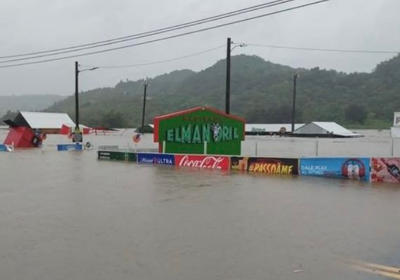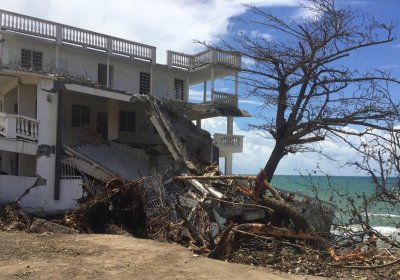It’s one thing to be displaced by a hurricane. It’s entirely another matter when real estate developers and US investors take advantage of the archipelago’s disaster for profit, writes Lola Rosario.
Hurricane Irma
The blackout that engulfed Puerto Rico when Hurricane Fiona laid bare the impacts of austerity and privatisation carried under United States fiscal control, reports Barry Sheppard.
Leaders from the Caribbean states are calling on the Donald Trump administration to seriously tackle the climate change crisis.
The call comes amid the Atlantic Hurricane season, one year after a series of hurricanes devastated several Caribbean countries and concerns that warming oceans could see another season of intense storms.
Greenhouse gas emissions contribute to global warming, which creates stronger hurricanes and rising sea levels. These events pose a unique threat to Caribbean countries.
St. Lucia Prime Minister Allen Chastanet said climate change could devastate Caribbean islands if global leaders do not act now to stop its extreme effect on the small islands.
The humanitarian crisis in Puerto Rico continues after almost two months after the hurricanes hit. The imperialist center in Washington continues to refuse to provide anything like adequate aid to its Caribbean colony.
The destruction caused by the two hurricanes that hit the island in September was worsened by a long history of imperialist exploitation, which has devastated the economy and infrastructure. This has greatly deepened over the past decade.
Puerto Rico is facing a huge humanitarian crisis after being hit by two super-strong hurricanes. It suffered a glancing blow by Irma and then a direct hit by Maria, both storms greatly strengthened by warmer ocean water caused by climate change.
The crisis is still unfolding weeks after Maria hit. The full picture and extent of the damage will not be known for some time.
Cuban brigades and volunteers are continuing the arduous task of rebuilding after the damaging and deadly effects of Hurricane Irma, one of the most powerful storms to hit the region that left dozens dead and caused widespread damage.
Described by meteorologists as one of the most powerful hurricanes to hit the Caribbean in a century, Irma left a path of widespread destruction in Cuba and several north-eastern Caribbean Islands, especially Barbuda.
Residents of the Caribbean islands of Saint Martin, Saint Barthelemy and the British Virgin Islands have been left with little support to face the humanitarian crisis caused by Hurricane Irma.
According to the latest count, nine people died on the French administered side of Saint Martin and hundreds more were injured after Irma hit on September 5. About 1 million people have had no water or electricity since the hurricane hit with winds of 250 kilometres an hour, destroying around 95% of the French side of Saint Martin.
Hurricane Irma has just passed through the Caribbean, in a procession of tragedies that have destroyed lives and left material damage behind.
In response to this natural disaster, Venezuelan President Nicolas Maduro sent humanitarian aid to Cuba, Antigua and Barbuda (with 95% of buildings in Barbuda destroyed), and the French colony of Saint Martin on September 10.
As Barbuda, part of the Caribbean island nation of Antigua and Barbuda, reels from having almost the entirety of its infrastructure and 95% of its homes destroyed due to Hurricane Irma, the International Monetary Fund (IMF) has rejected a moratorium proposal to discuss the island's US$3 million dollar debt.
The huge devastation, death and misery that Hurricane Harvey wreaked upon Texas and Louisiana has been seen around the world.
Meanwhile, fresh havoc is being wreaked upon the Caribbean and the US’s south-east by Hurricane Irma. In less reported news, more than 1400 people have been killed in recent weeks by horrific flooding in South Asia. The consequences of such disasters caused by extreme weather reveal the intersection of crises caused by the capitalist system.










